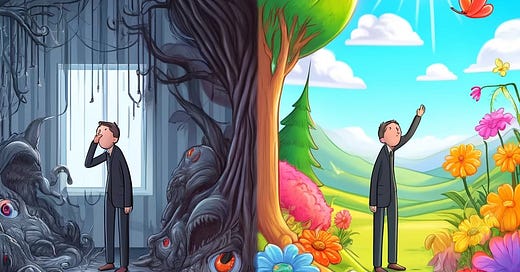Humanity’s Values is a reader-supported publication. Please consider subscribing as a way of supporting the delivery of the content you’re appreciating. Also, feel free to share and expand the community of reflective critcism.
Human perception intuitively seems a simple connection, we see reality unfiltered. Yet, mood changes perception. "I know what I saw" is a typical reaction when confronted with information challenging what we thought we saw. This is particularly prevalent when emotions are running high, the full weight of our need to be right bearing down on a single vision. Despite this, in calm reflection, we can usually acknowledge how influential our mood is on what we see and hear and its ability to guide our actions. This reflection will likely be connected to the times an apology was warranted, the "I'm sorry, I didn't hear you, what you were saying, I was really upset," being declared in quiet chagrin.
Mood's ability to change perception is not simply a recognition of the mind's role in our lives; it is a broader identification of the false nature of our sense of control. We never perceive the world "as is" or unfiltered, not because we can't do so, but because the world doesn't exist "out there." We are not anymore separate from the world than we are separate from our emotional states, it is one broad relational continuum. The only quality determining distance is the level of hubris we bring to our description of experiences. The degree to which we say that a singular vision of an experience represents the totality of embedded information determines the level of potential error in our judgment and undermines our ability to change and adapt to life.
Stress and Anxiety
Consider an experiment by Rony Paz at the Weizmann Institute of Science in Rehovot, Israel. Paz guided participants to connect a particular tone with either an increase or decrease in monetary reward. Once the association was established, participants were asked to identify the correct tones from a wider range. Those with a greater degree of anxiety made twice as many false connections than those with lower anxiety. Essentially, the anxious people overgeneralized their concerns and made false associations with what is typically considered objective reality.
"Overgeneralisation is thought to play a role in post-traumatic stress disorder and general anxiety disorder, a condition characterised by anxiety about many situations, leaving people in a state of near-constant restlessness." (New Scientist)
Further, let's consider stress, the most common of emotional states running in the background of our lives:
"Stress makes you more emotional, which can influence your interpersonal interactions. In addition, stress decreases what is called "working memory," which is the amount of information you can hold in mind at any moment. Decreasing working memory can give you tunnel vision and make you miss obvious solutions to problems." (Fast Company)
Emotions
What's missing from the above quote is that all emotions shift the information available to us. Emotions provide an automatic initial assessment of and guide for reacting to the vast panoply of experiences in our lives, from meeting a new person to determining how to run a company. This process is concerned with changing the information for evaluation to make each situation more immediately accessible, not necessarily to make it clearer.
When considered in this way, our lives may appear to be hopelessly confused, though thankfully, that is not the case. Acknowledging the power of emotions to shape perception does not mean we can't engage in meaningful actions and generative dialogue; it simply points out the need to be humble in evaluating the legitimacy of our judgments. "The best we can do is a compromise: learn to recognize situations in which mistakes are likely and try harder to avoid significant mistakes when the stakes are high" (Kahneman, 2011)
Whether our lives are being shaped by depression or working in a particularly difficult office environment, noting the power of our emotions and how mood changes our perception is about embracing our humanity. We are not as separate from the world as we believe; it is the relational stage upon which we live our lives.
Resources:
New Scientist: Anxious people hear some sounds as more important than they are
Fast Company: Ask the experts: how do I develop a thicker skin?
Kahneman, Daniel (2011-10-25). Thinking, Fast and Slow (Kindle Locations 405-406). Farrar, Straus and Giroux. Kindle Edition.






Thanks for sharing!